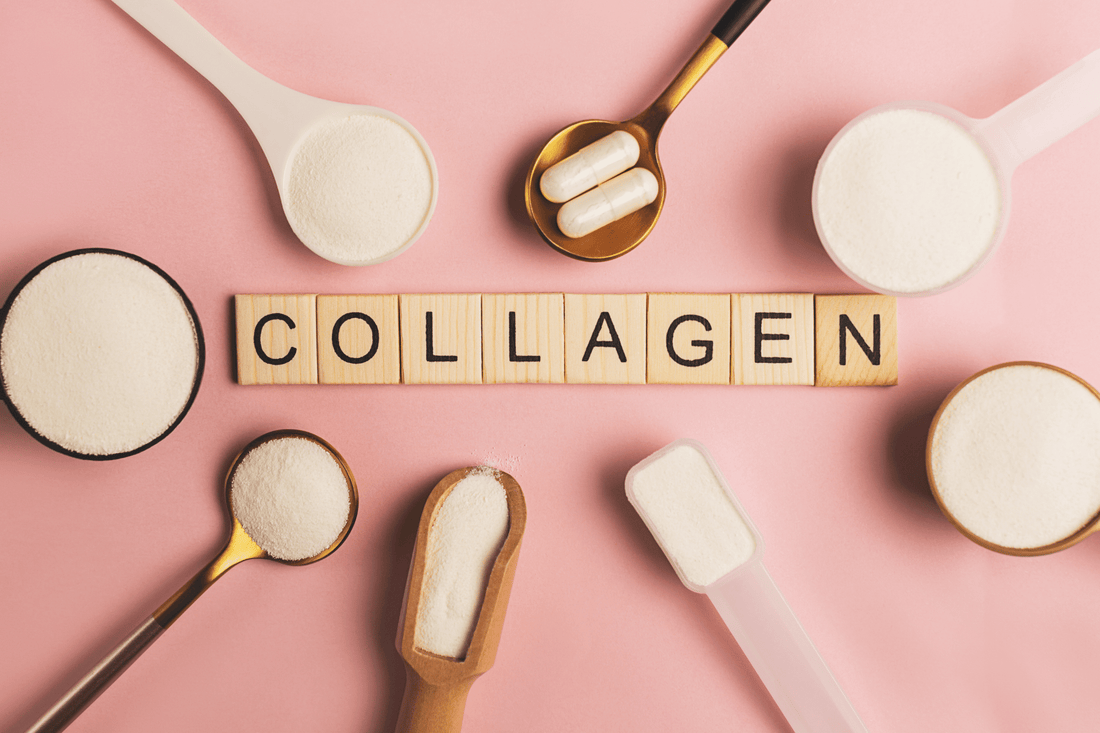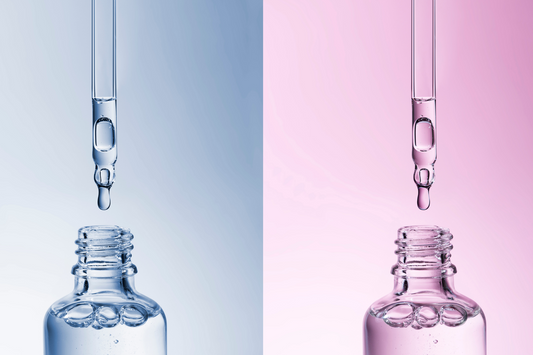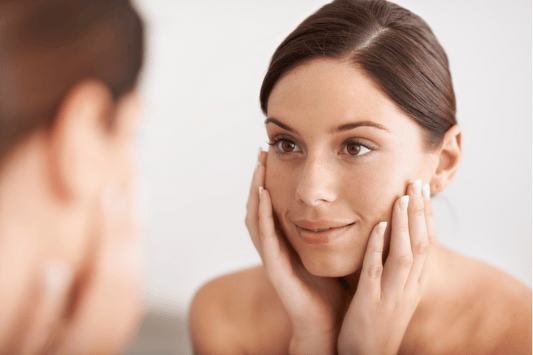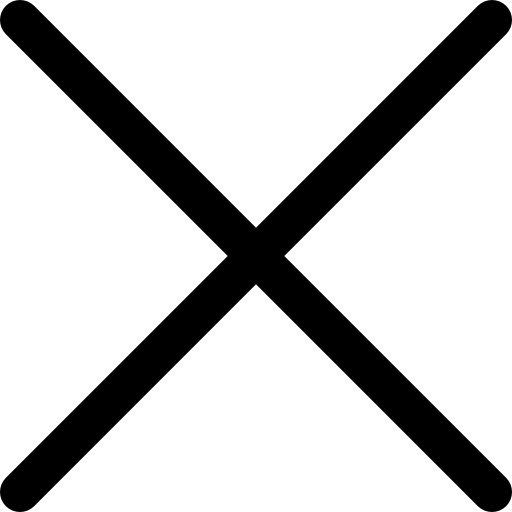Collagen supplementation for hair loss has increased in popularity, and you're not alone if you’ve considered taking collagen to increase your hair’s growing power. If you’re struggling with hair loss, you’ve probably tried many remedies to slow the shedding of your strands. Understandably, once you’ve tried a product and been underwhelmed with the results, it’s normal to be skeptical about other methods.
Let's clear up some of the misinformation surrounding collagen for hair loss. We’ll explore whether collagen can address hair loss, what makes hair grow in the first place, and what you can do if you are experiencing hair thinning. We’ll also explore a revolutionary new way to help stimulate your hair follicles and nourish your roots based on an AI-discovered ingredient.
What Is the Role of Collagen in Hair Growth?
Collagen is an extremely popular supplement, taken for joint health and for the purported benefits it may have for skin, nails, and hair.
What Is Collagen?
Collagen is a protein, the most abundant one in your body. It makes up connective tissues, ligaments, and tendons and is a building block of your skin. As we age, our bodies make less collagen, which makes supplementation seem like a good solution.
The Role of Collagen in Keratin Production
Collagen, like keratin, is a protein made up of amino acids. Amino acids are the building blocks that make up different proteins. Your body can use some of the amino acids in collagen to make keratin, the protein that makes up your hair.
However, this doesn’t mean your body requires collagen to synthesize keratin. You get most of the vitamins and fatty acids needed to create keratin through your food. Salmon, sweet potatoes, onions, mango, and multiple other foods contain the vital ingredients needed by the hair matrix cells to synthesize keratin.
This means that even if your body isn’t making as much collagen as it used to, it may not be affecting your hair’s growth.
What Can Collagen Do for Your Hair?
The short answer is that it’s still up for debate.
Collagen is an essential protein for your skin, and studies have shown that taking a collagen supplement could lead to skin that is more hydrated, has better elasticity, and has a better overall appearance.
Because your hair follicles reside in your skin, we can expect that healthy skin will naturally help support your hair follicles. However, it would take a giant leap to connect collagen’s potential skin benefits to the idea that it could stop hair loss or help you grow new hair. There’s just not enough scientific evidence to support this hypothesis.
That doesn’t mean that taking a collagen supplement is a bad idea, but the fact that it probably won’t stop you from continuing to lose hair may not make it a viable or useful option for some.
How Does Hair Growth Work?
In order to properly understand what makes your hair grow, it’s important to have a little background knowledge of the anatomy of the hair and the structures that support it.
The Anatomy of Hair
Each hair has numerous parts that help support it as it grows and eventually sheds.
- Shaft. The shaft is the portion of your hair that you see. Melanin in your hair determines the color of the shaft. The shaft extends to the base of your scalp. The shaft is also the portion of your hair that you cut and style.
- Root. The root is the portion of the hair shaft that lives below your scalp and is encased in the hair follicle. The root of your hair may only be one millimeter in length.
- Hair follicle. The hair follicle is the protective casing that surrounds the root of your hair. It is made up of connective tissue and skin. Within the hair follicle, the hair grows up through the opening at the top, called the pore.
- Bulb. The large area at the base of the hair follicle where new hair grows.
- Dermal papilla. This is a structure located in the bulb where cell proliferation takes place. Blood vessels connect to the dermal papilla to supply it with nutrients and blood for cellular growth.
Your hair grows from the dermal papilla and pushes through the hair follicle to the epidermis. This happens in a continuous three-phase cycle.
The Hair Growth Cycle
Each phase of your hair growth cycle is determined by the dermal papilla, which acts as a manager, giving direction to the hair and signaling it to switch to the next growth cycle phase.
- Anagen phase. During the anagen phase, your hair grows. Cells in the DP begin to proliferate and attach, forming a chain. As these cells grow, they harden and become a strand of hair that pushes upward through the follicle. The cells become “keratinized,” which means they harden. They harden because they are made of a hard protein called keratin. Your hair is made up almost entirely of this protein. About 90% of your hair is in the anagen phase at any given time. That’s encouraging because it means much of your hair is in a steady state of growth. This growth phase can last for years and is different from person to person.
- Catagen phase. The catagen phase is a transitional phase of hair growth. During this phase, the root of the hair shaft detaches from the dermal papilla. At this point, it is no longer supplied with blood or nutrients and, therefore, discontinues growth. The hairs that reach the catagen phase are referred to as “club hairs.” This phase lasts about two to three weeks.
- Telogen phase. This is the final phase of hair growth and is also referred to as the resting phase. During this phase, the anagen phase of a new hair will begin beneath the club hair that is now resting in the hair follicle.
Eventually, the new hair will push the club hair out of the epidermis and replace it. This phase can last between three to four months.
It’s common to lose between 50-100 hairs per day, but if you are dealing with thinning hair, every strand that falls can cause you added stress.
What Causes Hair Loss?
Numerous factors affect hair loss, including genetics, ethnicity, and age. Some dietary and lifestyle habits (like smoking or pulling your hair back in tight hairstyles) can cause you to lose hair prematurely. Styling tools, chemical processes, and hair products can also contribute to hair loss.
Some of the most common reasons you might be experiencing hair loss are androgenic alopecia, telogen effluvium, and alopecia areata.
Androgenetic Alopecia
A byproduct of testosterone causes this type of hair loss. Although it’s the underlying cause of male pattern baldness, it also affects women.
Our bodies make an enzyme called 5ɑ-reductase. This enzyme converts some of the body's testosterone to dihydrotestosterone (DHT). DHT can bind to androgen receptors in your skin and hair and cause damage to the hair follicle.
This can result in the follicle succumbing to miniaturization, which causes it to shrink and become unable to support the growth of new hair. Over time, it can cause the hair follicle to lie dormant.
Telogen Effluvium
Certain physical, emotional, and hormonal triggers can cause large portions of your hair to be thrust into the telogen phase at once. Hair sheds in a pattern inconsistent with the usual three-phase cycle when this happens.
A good example of telogen effluvium is the hair loss experienced after pregnancy. Female pattern hair loss is also an example of telogen effluvium.
Alopecia Areata
Some people who suffer hair loss have alopecia areata. Alopecia areata is an autoimmune disorder that causes the body’s immune system to target and attack the hair follicles incorrectly.
There are numerous different types of alopecia areata, including alopecia totalis, which affects the entire head of hair, and alopecia universalis, which affects hair on the entire body. Many people who suffer from alopecia areata experience hair loss in patches. This means they will lose hair in small, circular patches on their head and some parts of their bodies.
These are just a few reasons you might experience hair loss or thinning hair. Other factors, like chemotherapy or trichotillomania, could also contribute to losing hair.
Regardless of the cause, you want a solution — and if collagen doesn’t work, what will?
What Should I Do About Thinning Hair?
It’s normal to search for alternative treatments for hair loss, as hair loss and thinning can be disheartening.
That’s why we created our Hair Revival Serum. Revela’s innovative, AI-discovered ingredient, ProCelinyl™, targets the very same dermal papilla we mentioned earlier to stimulate your hair follicle and reawaken your roots. It's effective, hypoallergenic, and even safe for pregnant or nursing women.
Using our Hair Revival Serum is easy, and you’ll see results in six to eight weeks — or your money back.
Stimulate Your Roots, Get Great Hair You Love
There’s a lot of information about hair loss and restoration available with the click of a button, but if you’re tired of spinning your wheels and feeling frustrated with products that don’t work (or experiencing side effects that you never expected), we understand.
At Revela, we’re working to change the way people talk about hair loss. We think it’s time to normalize the conversation about a condition many people will experience in their lifetime. We also believe it’s time for innovation.
With us, you can expect the support you deserve and a solution that fits your lifestyle. Revela can help stimulate your roots and give you the hair you love— past, present, and future.





